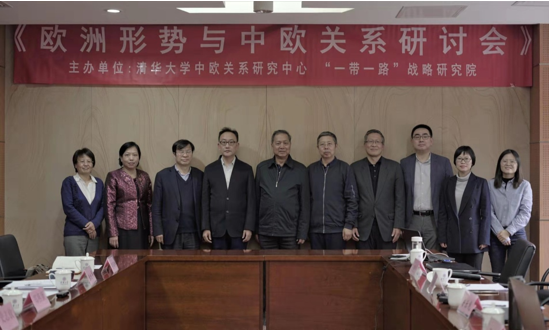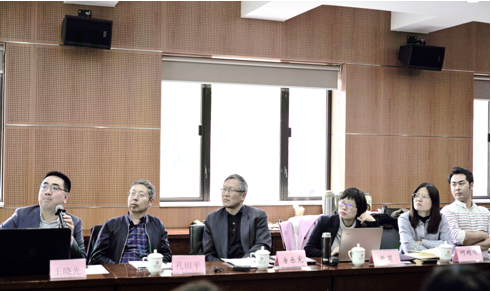Huang Chuyan
College, Peking University
On 23 November 2019, a seminar on the "European situation and China-EU relations", jointly sponsored by the China-Europe Relations Research Centre of Tsinghua University and The "Belt and Road Initiative" Strategy Research Institute was successfully organised.
Experts and scholars in the field of European politics and China-EU relations have gathered to exchange some of the latest academic research results and promote the collision of ideas under the complex and changing European situation.

Professor Zheng Yankang, Chairman of the Council of the China-EU Relations Research Center at Tsinghua University, delivered a speech before the start of the seminar.
The meeting was divided into two sessions. The theme of the first seminar was "new trends in Europe and the EU",chaired by Professor Zhang Lihua, Deputy Director of the Institute of European Studies of the Chinese Academy of Social Sciences. Professor Tian Dewen from the School of International Relations at Renmin University of China, Professor Shi Zhiqin, Executive Director of the Institute of The "Belt and Road Initiative" Strategy Research Institute at Tsinghua University, and Wang Xiaoguang, School of Economics and Management of the China University of Petroleum have been the speakers of the first seminar.
The theme of the second session had been "China-EU relations and the new trends in Brexit", chaired by Professor Shi Zhiqin. Professor Kong Tianping from the European Research Institute of the Chinese Academy of Social Sciences, Professor Zhang Lihua, Director of The China-EU Relations Research Center of Tsinghua University, Ms Ge Fengyan, Asia Pacific Chief Representative of of Laskaridis Shipping Company in Greece, Associate Professor Zhang Li, School of Journalism and communication, Tsinghua University, and Dr. He Qingqian, Department International Relations, Tsinghua University, delivered speeches respectively.

The opinions put forward by the experts and scholars mainly involve the following:
●As for the trend of European populism, Professor Tian Dewen believes that populism is a kind of deconstructive force, which will make the original right-wing and left-wing ideology more radical after coming into power, but its policy is of low operability. What is really worth worrying about is the "populization" of the main stream politics under the influence of the radical parties.
●As for the changes of political parties in EU countries, Professor Shi Zhiqin pointed out that this year's election of the European Parliament reflects the trend of fragmentation of political parties in the EU, which is mainly reflected in the increasing regional differentiation between Central and Southern Europe and North-West Europe, and the decline of the seats of the main political parties in the core area, which leads to the growing internal division.
●Dr. Wang Xiaoguang analyzed the governance style and characteristics of these leaders from the perspectives of French President Marcon and British Prime Minister Boris Johnson. Boris Johnson adhered to Brexit, according to Dr. Wang, but his policy strategy was very flexible,. Johnson knows very well the weaknesses of his domestic and European political opponents (the Labour Party and German politicians) within the Brexit strategy. Marcon, on the other hand, returned to the tradition of Gaullism, preferring populist style on internal security, immigration policy and other issues. Macron began to seek an independent French line in foreign relations and had many radical ideas on EU reform.
●Professor Fang Le Xian discussed the history and current situation of EU's pursuit of Strategic Autonomy, pointing out that the re-emphasis of the EU on Strategic Autonomy, in a more complex and competitive international environment, reflects the current pessimistic understanding of Europe's external living environment, that the impact of the European debt crisis has not been eliminated and so on.
●In terms of China-EU relations, the experts and scholars formed different perspectives that gave a review and outlook on various levels. Professor Tian Dewen believes that the rise of European populism makes European diplomacy swing in both radical and pragmatic aspects, and that opportunities and challenges coexist for China-EU relations.
●Professor Kong Tianping reviewed the political and economic reforms of Eastern European countries in the past 30 years and pointed out that the drastic changes in Eastern Europe laid the foundation for the development of bilateral economic and trade cooperation between China and Eastern European countries.
●Professor Zhang Lihua analyzed the positive and negative evaluation from German think-tanks experts on China's "Belt and Road Initiative". The reason why German think-tank experts are generally vigilant about the "Belt and Road Initiative" is that they are closely related to their ideology, social and political system, Chinese enterprises' prejudices and psychological prevention.
●Ms Ge Fengyan described the new development of Chinese-Greek relations and how these benefited from people-to-people and cultural exchanges beforehand, leading the way to promote economic and trade cooperation. Ms Ge also detailed the development process of COSCO Group's Piraeus port project.

Focusing on Brexit, Zhang Li and He Qingqian used qualitative and quantitative methods to conduct the discussion based on empirical research. Associate Professor Zhang Li interviewed 23 British elites on the issue of Brexit and summarized their views. She pointed out that there was a conflict between Britain's sense of independence and superiority, and the idea of European integration. British elites were not prepared for Brexit, and there was also a relatively large conflict between the system and behaviour.
Dr. He Qingqian analyzed the predictions of many British institutions on the results of the December British parliamentary election. Most of them predicted that the Conservative Party would win more votes than the Labour Party, and that Boris Johnson would win more votes than Corbin, which was related to the positions and attitudes of the two parties towards Brexit, the strategies they adopted, the issues they valued or the personal factors of the candidates.
Therefore, the experts and scholars have made a profound interpretation of the current complex situation in Europe and upon China-EU relations from multiple perspectives. Meanwhile, the academic research results they have shared are rich, profound and splendid, which makes the participants enjoy an unforgettable spiritual academic debate.
(Translated by Radu Sava.)